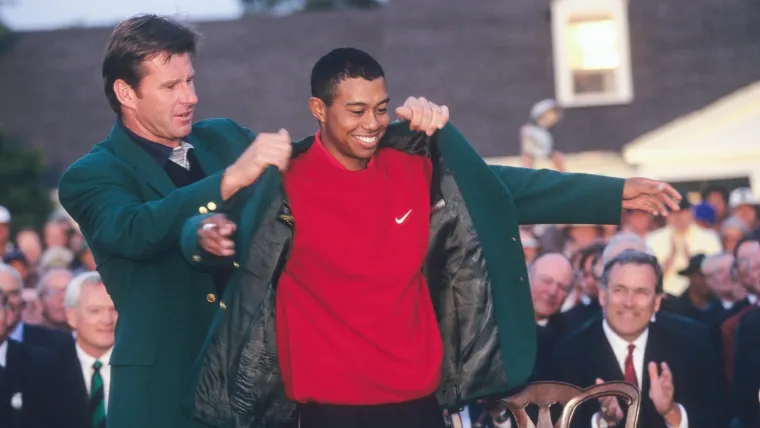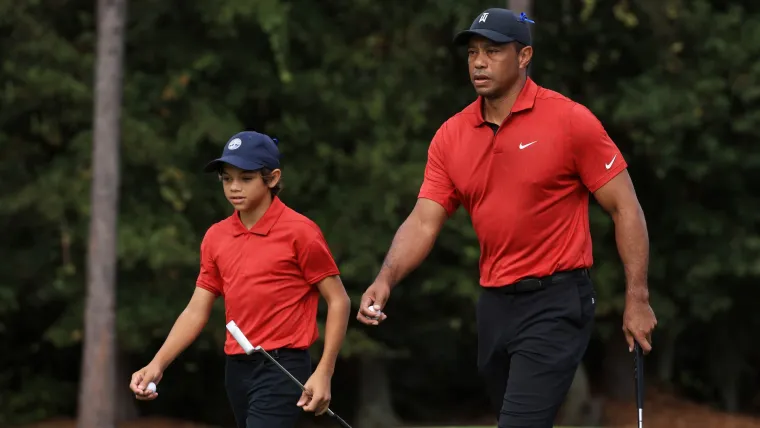Tiger Woods didn't just open the door for other who look like him, he knocked down the entire structure of the Masters.
In the process 25 years ago, Woods made his clearest statement to that point that he was going to be a force in the world of golf.
At only 21, his four-day score of 270 (18 under par) was a tournament record, leading to yet another mark for the youngest Masters champion in history: He finished 12 shots clear of runner-up Tom Kite.
25 years ago, Tiger Woods won his first Green Jacket.
— The Masters (@TheMasters) April 4, 2022
The game would never be the same. #themasters pic.twitter.com/3TJ9FarDbs
The following column, by contributing writer Dave Kindred from the scene at Augusta National, appeared in the April 21, 1997, issue of The Sporting News.
MORE: Revisiting Tiger Woods' first Masters win 25 years later
AUGUSTA, Ga. — From this day forward. Tiger Woods must wear an eye patch. Before each putt, he must say, "Mother, may I?" and hop three times and putt while both feet are in the air. Former girlfriends will be invited inside the gallery ropes and encouraged to recite embarrassments at the top of Tiger's backswing. He must hit every wood shot without removing that tiger head cover. He can use any ball he wants as long as it has a red stripe around it. Roseanne will be his caddie.
Stern measures, yes. But stern measures are called for. Or the world of golf will never be the same.
Every fifth hole, his playing partner can break the Tiger club of his choice. Tiger must play in rain falling from a movie company's giant sprinkler while everyone else plays in the sunshine. Which means Tiger will wear a raincoat and galoshes while holding an umbrella. If, despite these measures, he still gets under par, he must finish the round using a hand trowel and pool cue.
One day at a tournament in California, Tiger Woods got steamed. Somebody in the crowd had clicked off a camera just as Tiger prepared to hit a shot. "How would you like it," he snapped at the offending citizen, "if I came into your office while you're working and fired a shotgun over your head? That's what that sounds like to me out here." Hmmm. A shotgun fired over his head. Now, there's an idea.
Just having fun here, folks. What Tiger Woods did in the Masters is so surreal as to invite hallucination.
The newest American hero has won the grand old tournament at 21, the youngest champion ever, he won with a record score and record margin by playing golf seldom imagined let alone realized. He hit shots so far, so straight, so high and with such majesty as to leave mere mortals believing they should apologize for their miserable efforts in his supranatural company.
"Incredible." Jack Nicklaus said. … "A boy among men — and the boy showed the men how to play," Tom Watson said. … "Unbelievable," said Charlie Yates, 83, a friend of the sainted Bobby Jones who invented the Masters. And what would Bobby himself have thought? "I'm telling you," Yates said. "Unbelievable."
And the golf records themselves were the least of Tiger's accomplishment. More important than any numbers was one color. The color of his skin. The son of a Thai mother and African American father, Tiger Woods is the first man of color to win one of golf's four major championships.
And he did it at the best place to do it if you wanted folks to sit up and take notice. He did it in a Georgia town at a tournament that for so long, either by design or circumstance, was closed to Blacks. Those people who saw design at work were often moved to anger Calvin Peete came to the Masters in 1980, the second Black player in the tournament's history, and he once said, "Asking me if I enjoy being here is like asking if we enjoyed slavery."
A different time now. Different perspectives. For Peete and for the first Black player, Lee Elder, the Masters came with a plantation feel.
For good reason considering the place and the time — the American South in the 20th century — the Elders and Peetes thought of themselves as field hands who were allowed, briefly, to visit the massah's big house.
But now comes Tiger Woods with the shoe company's $40 million deal. Tiger Woods who has never been a field hand. Tiger Woods who has led a privileged life. Calvin Peete sold jewelry out of his car trunk to migrant workers in Florida until, past 30, he made a dime playing golf. Lee Elder rode country highways with the famous hustler Titanic Thompson, the old man and the Black kid teeing it up against anyone foolish enough to mistake age and color for weakness.
And now comes Tiger Woods. His swing is silken beauty rather than a clanking assemblage of spare parts put together on hardpan goat hills. And he speaks not of anger but of what a victory can do for people, young minorities especially, who might be moved by his victory to try the game.
Lee Elder first came to Augusta in 1975. He was 40. He came again at 62 for Tiger Woods. He came on Sunday morning when the kid would win. Under the mighty oak trees by Augusta National's clubhouse, Elder said, "Tiger Woods wins here, it might have more significance than Jackie Robinson's break into baseball. No one will turn their head when a Black man walks to the first tee."
Then Elder moved to a practice area to speak to Woods, a moment Woods liked. "He was the first," Woods said. "He was the one looked up to." Then he called a roll of men excluded by the fact of their color, Elder and Charlie Sifford and Ted Rhodes. "Because of them, I was able to play on the PGA Tour. I was able to live my dream because of those guys."
Now comes Tiger Woods, the one and only.
And we'll see what it means. "A lot of kids will start playing," he said, "and over time, hopefully, I'll be around to see the fruits of the things I've accomplished. … I think that now kids will think golf is cool, really."
And make no mistake about Tiger Woods, the competitor. He knows history and he chases it. His is a dream dreamed large. For the first time ever, so powerful was Woods' work, it is reasonable to think of a man winning all four majors in a year, the Grand Slam. The question was put to Woods this way: "Tiger, how soon is a slam?
The clever champ smiled. "A slam dunk?"
Then he said the right things about how difficult such a feat would be, how much luck would be required, how many great players there are. All of which he wrapped around one meaningful sentence.
"I think it can be done," he said.
Yes, the world of golf is about to be born anew.




